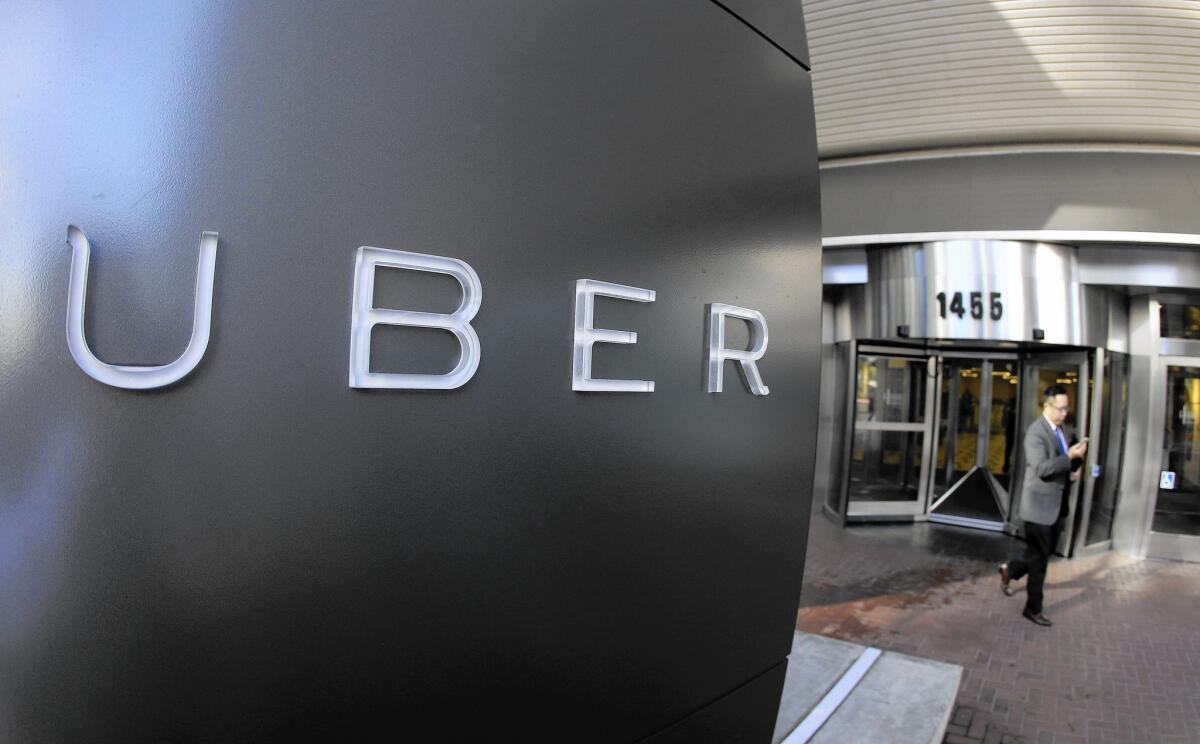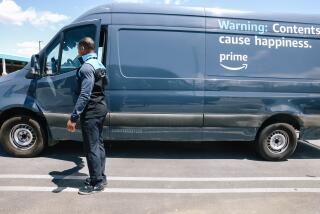Uber drivers granted class-action status in legal battle

Uber drivers scored a victory Tuesday when a federal judge ruled that they could move forward with a class-action lawsuit that seeks to designate them as employees, not independent contractors.
U.S. District Judge Edward Chen in San Francisco ruled for the plaintiffs, denying the on-demand transportation company’s motion for a quick judgment and allowing the lawsuit to proceed as a class action.
The decision could have deep implications for Uber and other companies in the fast-growing on-demand economy, in which customers use smartphone apps to order services such as car rides and home delivery of groceries and restaurant food.
Potential profit margins are much higher if Uber drivers or delivery people are considered contractors, because it keeps overhead costs low; responsibility for employment benefits, tax payments, health insurance and work-related expenses lies with the worker.
Uber now stands to lose far more than if the case had proceeded as a suit involving only three plaintiffs. In addition to potentially being on the hook for back wages, sick leave, expenses and benefits, the company could be ordered to pay gratuities owed to thousands of former drivers.
“We’re talking about millions of dollars,” said Lonnie Giamela of labor and employment firm Fisher & Phillips.
And that doesn’t even touch on what a loss would mean for Uber’s independent contractor-reliant business model, which has earned the company a $50-billion valuation.
It’s enough to deter new start-ups looking to move into the on-demand industry from adopting the Uber business model, said litigation attorney Gillian Overland of Overland Law & Mediation Firm.
“I think people are looking at every step taken in this case, and it definitely heightens the analysis of whether or not the classification of the people working for your company is appropriate,” Overland said.
Plaintiff lawyer Shannon Liss-Riordan, who is also representing Lyft drivers in a separate class-action lawsuit against Lyft, Uber’s top competitor, said in a prepared statement that Chen’s decision Tuesday was a “major victory” for Uber drivers.
“It will allow thousands of Uber drivers to participate in this case to challenge their misclassifications as independent contractors, as well as to attempt to recover the tips that Uber advertised to customers are included in the fare, but are not in fact distributed to the drivers,” she said.
The class is not as big as Liss-Riordan had hoped the judge would certify, though. The certified class excludes current and recent Uber drivers bound by Uber’s 2014 arbitration clause. And one of the three plaintiffs, Thomas Colopy, was also found to not qualify.
Uber has had different contracts throughout the years, the most recent of which includes an arbitration clause preventing drivers from suing the company in a class action. Under the clause, all legal disputes must be resolved through arbitration proceedings.
An Uber spokesperson said this leaves them with only a “tiny fraction of the class [of 160,000] the plaintiffs were seeking.”
Neither Uber nor the lawyer for the plaintiffs could provide a number for the class size, but Liss-Riordan said it “will be many thousands.”
Uber’s spokesperson said the company plans to appeal.
In his decision, Chen used one of Uber’s own arguments against the company, saying that Uber argued it classifies “every single driver” as an independent contractor, and the treatment of every driver as an independent contractor is something all Uber drivers have in common.
The problem, according to Giamela, is the company argued against the merits of the case instead of the merits of class certification.
“What the court said was, look, that [argument] might be good for the purpose of the merits for the case, but you’re essentially admitting to the court that you treat everyone the same, which supports a finding for class certification,” Giamela said.
Uber had a lengthy showdown with Liss-Riordan in court last month when both sides argued over class certification.
The popular ride-hailing company presented the court with individual testimony from 400 Uber drivers who said they wanted to remain independent contractors. That testimony, Uber attorney Ted Boutrous said, showed that the three plaintiffs did not represent the interests of all Uber drivers.
During court arguments, Liss-Riordan shot back, saying the lawsuit was not a popularity contest, nor was it about what drivers want. Rather, it was about whether Uber had misclassified its drivers.
Chen noted at the time that although 400 is an impressive number, it is only around a quarter of a percent of the 160,000 people who have driven for Uber in the U.S. Uber has not revealed how many people drive for the service around the world.
A trial date has not yet been set. Liss-Riordan said in a prepared statement that the court has invited both sides for further briefing, “which will allow us to address how the request for expense reimbursement can be handled on a classwide basis.”
Twitter: @traceylien







